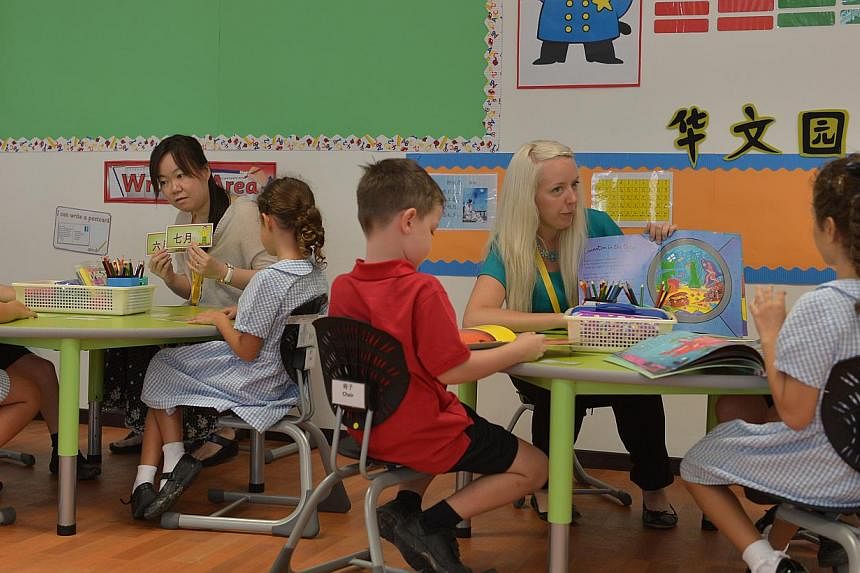Singapore students may complain about the daily grind of Chinese language lessons. But at Singapore's newest international school Dulwich College, parents are all for lessons taught in Mandarin and English.
That is one of the reasons the renowned British independent school, which opened in Singapore last week and charges $25,000 to $31,000 a year, had to hire more teachers and double its first intake from 400 to 884.
The school received 1,500 applications, and one of the main draws is the emphasis on Mandarin.
Children from the ages of two to seven are taught by two teachers, in English and Mandarin, in the classroom. Called the dual language approach, the idea is to expose children to English and Mandarin at a young age, enabling them to move seamlessly between the two languages. In the junior school, until age 11, they will have daily Mandarin classes.
The school's headmaster Nick Magnus, who used to head Dulwich in Suzhou, China, said: "Proficiency in Mandarin opens doors. Parents see the value in it."
On the dual language approach, he said: "There are clear benefits in language learning, especially for young children, with this approach. I think it will become a standard approach for many in international education."
Mrs Katharine Ankers, whose two children are in Dulwich, said: "We liked the fact that Mandarin plays an important part of the curriculum, with lessons on a daily basis, and at different levels depending on the child's exposure to the language."
The 395-year-old school, which has six other campuses in Asia including Beijing, Shanghai and Seoul, will offer an enhanced British curriculum and prepare students for the International General Certificate of Secondary Education and the International Baccalaureate diploma at age 18.
The school said its Singapore campus - like the other colleges in Asia - will embrace "an academic ethos shaped by Eastern rigour and the Western holistic approach".
For some parents, the emphasis on academic rigour is also a plus point, although some initially complained about potential students above the age of seven having to take an entrance test.
Briton Isabella Porter, who is hoping to get her two teens into Dulwich next year, said her husband agreed to take a job in Singapore only after the two of them heard the school is opening a campus here.
"Dulwich offers a first-rate education and the emphasis on Mandarin is a bonus. We only agreed to move to Singapore because of Dulwich opening here."
More than half of the pupils for its first intake are in the two to seven age group. More than 200 pupils are in the junior school - for those aged seven to 10 - and another 132 students are in the senior school.
Dulwich, which charges fees comparable to that of some of the other international schools here, will eventually grow its student number to 2,500.
The school's 5ha Bukit Batok campus, which will have state-of-the-art classrooms and laboratories, theatres for the dramatic arts, a swimming pool and a rugby field, is expected to cost more than $400 million.
Dulwich's entry has gone some way in satiating the demand for international school places here. Market research shows there are about 40,000 students in more than 30 international schools in Singapore.
A few years ago, the crunch in places became acute enough for foreign business chambers to warn that it was a stumbling block for international firms looking to set up here.
The Economic Development Board, which has held three bien-nial exercises since 2008 to help ease the crunch, has said it is not currently looking to lease new sites to international schools this year.

